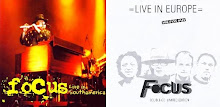Archive number: 15d
Title: Eruption (Part 4 - Answer, Orfeus, Euridice)
Main Album: Moving Waves (Focus 2 in Holland)
Track number: 6d
Genre: Progressive Rock (Symphonic)
Studio: Sound Techniques Studio, 46a Old Church Street, Chelsea, London SW3
Length: 2' 57" (22' 57" the whole)
Composer: Thijs van Leer, (Tom Barlage, Jan Akkerman), Eelko Nobel, (Pierre van der Linden)
Musicians: Jan Akkerman – Electric guitars (Gibson Les Paul Customs), Bass; Thijs van Leer – Hammond organ, Piano, Voice; Cyriel Havermans - Bass; Pierre van der Linden - Drums
Producer: Mike Vernon
Engineer: Jerry Boys
Label: LP - Imperial, Blue Horizon CD – EMI Bovema, IRS, Red Bullet
Date of recording/release: April, May 1971/October 1971. CD - 1988, 1993, 2001
Alternative version: The original Eelke Nobel contribution can be heard briefly in the background on the Ramses Shaffy album Sunset Sunkiss.
Notes: Eruption is a brilliant composite piece that pulls together various musical elements. Album notes refer to as many as 15 different parts though the nature of the music means that there are overlaps and the debatable nature of deciding just where one part ends and another begins is reflected in the varied timings given. We present here our own attempt to convey what is included.
20:01-22:57
The final section appears to be edited down with overdubs possibly from the previous Answer, Orfeus and Euridice.
20:01-20:33 Answer
First we have the slow and fast parts of Answer
20:34-21:25 Orfeus
Then the 'violined' guitar and organ with heavy drums of Orfeus.
21:26-22:57 Euridice
Finally we have the piano and guitar then flute and piano with organ and bass of Euridice. At 22:34 heavy drums come in and their fading erupting sound ends the piece.
Note on Orpheus and Eurydice (from Wikipedia)
Orpheus, a figure from Greek mythology, was king of the Thracian tribe Cicones. Pindar calls him "father of songs". His name is not in Homer or Hesiod but he was known by the time of Ibycus (c 530 BC). He was believed to be one of the chief poets and musicians of antiquity and the inventor or perfector of the lyre. With his music and singing, he could charm wild beasts, coax trees and rocks to dance and even divert the course of rivers. As one of the pioneers of civilisation, he is said to have taught humanity the arts of medicine, writing and agriculture. He was also an augur and seer; practiced magical arts, especially astrology; founded or rendered accessible many important cults, such as those of Apollo and the Thracian god Dionysus; instituted mystic rites public and private; prescribed initiatory and purificatory rituals. In addition, Pindar describes him as harpist and companion to Jason and the Argonauts.
The most famous story in which he figures involves his wife Eurydice (Agriope). While fleeing from Aristaeus, Eurydice ran into a nest of snakes which bit her fatally on her legs. Distraught, Orpheus played such sad songs and sang so mournfully that all the nymphs and gods wept. On their advice, Orpheus travelled to the underworld and by his music softened the hearts of Hades and Persephone (the only one who ever did), so that they agreed to let Eurydice return with him to earth on condition he walk in front of her and not look back until they had reached the upper world. In his anxiety he forgot and turned to look. She vanished a second time, now forever. The story in this form belongs to Virgil's time. He first introduces the name Aristaeus. Other ancient writers speak of the visit to the underworld but the story may actually be a late addition to the Orpheus myths.
Classical compositions featuring the story include those by Monteverdi, Telemann, Gluck, Haydn, Liszt, Offenbach, Stravinsky, etc.























1 comment:
Thanks for your wonderful blog. I don't know if you are still reading these comments, but I recently tried to track down the Eelko Nobel and Ramsey Shaffey connections to "Eruption." The Ramses Shaffy and Eelko Nobel connections: Focus co-credits Eelko Nobel for Euridice. I checked the 1969 album Sunset Sunkiss (Ramsey Shaffy) on Spotify. I found two Focuslike passages. One is the power chord @ 11:35 on “Sunset”, which sounds like Focus @ 17:45. Then on the 1969 track “Sunkiss”, @ 5:06-5:53, there’s a brief passage for organ and vocal that is vaguely similar to the Orpheus theme. Oddly, I didn’t find anything that sounds like Eurydice, where they credit Eeke Nobel. I went to discogs to find the credits for the album, and they don’t list Eelko Nobel at all, but -- as you probably already knew but I didn't -- his backing band is Focus! Since Shaffy is just doing spoken vocals, I take it that these passages were created by Ackerman and van Leer.
Eelko Nobel does appear on Ramsey Shaffy’s Shaffy Chantate (1968), as a member of Trio Louis van Dijk. Thijs is on a half dozen tracks and he is credited with Eelko as co-writers on a number of tracks. At least at first listen, I couldn’t hear anything even remotely like any melodies or passages from Eruption anywhere on that record. So I haven't pinned down Nobel's contribution to anything previously on record yet. I'd love to know more if anyone has more to share.
Post a Comment